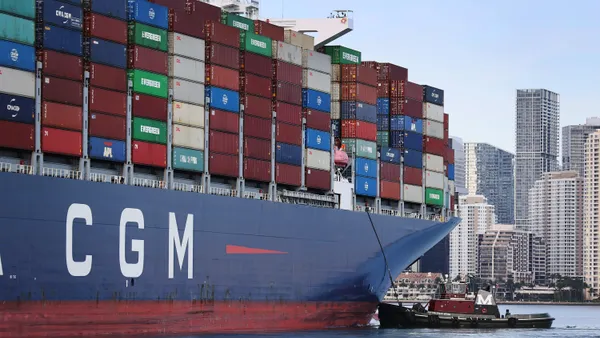Dive Brief:
- Air cargo volumes in August fell 5% YoY, extending a streak of reduced demand as global supply chain disruptions, inflation and excess inventory in the U.S. continue to disrupt the market, according to a news release from Clive Data Services last week.
- However, August's volume drop was softer than the YoY declines seen in June (8%) and July (9%). This could be an early sign of volumes and spot rates — which hit their lowest point since September 2021 — picking up again as peak season nears, said Niall van de Wouw, chief airfreight officer at Clive parent company Xeneta, in a statement.
- "If the fall in demand is easing, however, as August indicates, that capacity shift could see us return to a seller’s market again and load factors return to the mid 70% to 80% range," van de Wouw said. "It is fair to assume volumes will be higher in November than in August.”
Dive Insight:
The air cargo market has shifted in shippers' favor the past few months after they endured two years of capacity constraints and climbing rates sparked by the COVID-19 pandemic.
A boost in international flights to keep up with summer travel demand helped August air cargo capacity grow 7% YoY, according to Clive. Now, global capacity is just 9% away from recovering to 2019 levels.
At the same time, airlines are facing a tepid cargo demand environment compared to 2021. Inflationary pressures, elevated inventory levels in the U.S., the war in Ukraine and COVID-19 lockdowns in China presenting ongoing challenges for the market, according to Clive. Shippers are also being drawn away due to improving reliability in ocean shipping.
"The market remains soft and rate levels [are] similar to last week, but demand is expected to increase later this month," a Sept. 6 market update from Flexport said of airfreight in south China.
Lastly, air freight spot rates continued their decline in August, driven by falling jet fuel prices, to $3.61 per kg. However, that's still up 4% YoY and more than double the rate in 2019, according to Clive.
Although expectations of a muted peak season for air cargo remain in place due to supply chain disruptions, August's results could be the beginning of volumes and rates increasing once more, according to van de Wouw.
“In many respects, this latest data is quite remarkable relative to the two previous months because volumes in August — traditionally the quietest summer month due to the holiday season — levelled out and out-performed June and July when compared to last year’s volumes," he said.
Editor's note: This story was first published in our Logistics Weekly newsletter. Sign up here.














